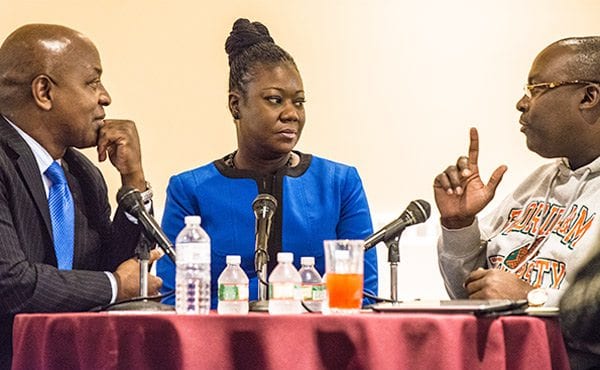
Issues of racial profiling and violence against black youth were front and center in a recent Cambridge forum with the mother of shooting victim Trayvon Martin and her attorney at St. Paul African Methodist Episcopal Church.
The event, which was attended by 200 people, included Sybrina Fulton, Trayvon Martin’s mother and Daryl D. Parks, the Martin family attorney, and was moderated by Professor Charles Ogletree of Harvard Law School and executive director of the Charles Hamilton Houston Institute for Race and Justice.
Organized by the Charles Hamilton Houston Institute, the St. Paul African Methodist Episcopal Church and the Cambridge Black Pastor’s Alliance, the goal of the forum was to have a community conversation around the issues that arose since 17-year-old Trayvon Martin lost his life and a not guilty verdict was delivered at the trial of George Zimmerman, who shot him.
The forum focused on the implications of the case for the future as well as what young black males must currently contend with. There was also much discussion about the “Stand Your Ground” laws implemented in 46 states, gun laws and gun control, increasing local violence, safety and race relations. The forum ended with an audience question and answer portion.
“Trayvon Martin’s death started the debate about violence against black youth and is a reminder of how the nation reacted to the brutal murder of Emmett Till in 1955 and the acquittal of his killers, which became a national story. The Trayvon Martin case has once again propelled race relations and racial profiling into the national and international spotlight,” said Professor Ogletree.
Sentiments of a painful past of racism and discrimination are relived for many community members at mention of Trayvon’s name. For younger generations, stories told became ever real with the injustices surrounding the circumstances of his death.
“One thing you have to remember about this case was when you get this question so often: What made Trayvon so special? I kind of hate that question — it’s as if the life of this young black man could not be worth anything, so what’s all the fuss about?” said Parks as he began to retell the events leading up to the trial.
He declined to comment on much of the trial, though he was very vocal in his critique of the jury selection process.
Parks also discussed gun issues and safety after Ogletree pointed out that there are 310 million guns in America — just about one for every citizen — which illustrates a cultural fascination with weapons.
Parks said he does not believe that the issue is gun rights, but gun safety and the need to reduce violence, as well as reduce stereotyping, improve neighborhood watch education and establishing human rights as an issue of greater concern.
“We have to start seeing people as people,” Parks said.
At times the atmosphere of the forum was reminiscent of a church service as audience members nodded, swayed, clapped and offered feedback with words and grunts of agreement and disapproval to statements made. The talk was very personal with Parks and Ogletree using clergy terms and drawing lots of parallels to racial experiences numerous people of color have had, like being pulled over for “driving while black,” and so on. Lighthearted jokes and comments were made as well. The air was heavy given the topic at hand though, simultaneously, compassion and love enveloped the room.
“What was Trayvon like?” asked one audience member to begin the Q&A segment. As all eyes turned to his mother Fulton, silence blanketed the room and her mostly solemn, painful expression changed to a warmer one. She had been mostly quiet but attentive as Parks entertained the legal questions. After describing Trayvon as a playful kid, her words: “He had to be close to me,” resonated with the crowd. Her affable nature came out as she opened up, divulging information about Trayvon and the state of her family since the barrage of media attention has subsided.
“He was very playful and he liked to have a good time. He liked to listen to music, go to the mall, dress nice and he had started getting into colognes he wanted me to buy him,” Fulton said. When asked what songs remind her of Trayvon, Fulton replied, “Two songs. One song that keeps me going is ‘Encourage Yourself.’ Then the song that I hear when I think about him is ‘Ribbon in the Sky’ by Stevie Wonder.”
Other questions included:
- How important is it for people of color to participate in jury duty and vote in all elections?
- What can young people do so this doesn’t happen again?
- How is Trayvon’s dad doing?
- How can people utilize their local legislature to ignite change?
- What are the do’s and don’t’s for youth when interacting with law officials
- How can members of the audience support the Martin family?
Those in attendance at the forum connected greatly with what was said.
“I just think for me and perhaps for many in the room, when they hear that song driving in their car or when they’re in a store they will connect to Trayvon because he has to be part of moving all of us — every nationality, every color — forward. We have to get past this,” said Andrea Gardiner, 52, of Cambridge.
“I took a bus for three hours to come … It was a great experience, I enjoyed it. I got to meet his mom and see her in person but to actually see the pain and at the same time the passion is inspiring to me,” said Clinton McKinnis, 33, of New York.
To end, a video on the Trayvon Martin Foundation was shown as people offered monetary donations to support the effort created in Trayvon’s honor.
“Trayvon will forever be before us. We can never let him go … Name streets, schools and places to eat after him. Don’t let his life be in vain,” said Ogletree.






